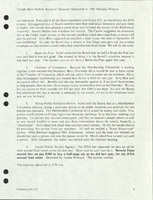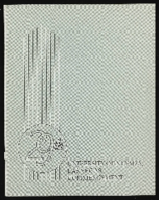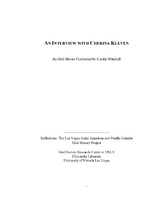Search the Special Collections and Archives Portal
Search Results

Transcript of interview with Marcy and Jack Simon by Barbara Tabach, May 16, 2018
Date
Archival Collection
Description
It was 1964 when Jack Simon met Marcy Stiel at a mutual friend’s wedding. Smitten from the beginning, the couple married shortly thereafter. Thus began their loving partnership that has flourished in business, community involvement, and most importantly in raising their two sons, Ron and Steven. The Simon’s can be a modest power couple. However, they are clearly capable of making things happen. When they first married, Jack was a California electrical contractor and homebuilder and Marcy became his business administrator. The Simons through their Electrical Company, Expo-Tech Electrical & Plumbing Services, Inc. won the contract to provide all of the electrical services for the entire 1984 Los Angeles Olympics, encompassing (26) twenty six venues located in California spanning from San Diego to Stanford University. The trajectory of the business was extraordinary, establishing twelve offices nationwide to provide temporary electrical and plumbing services for conventions and special events. Expo-Tech was eventually bought by industry giant GES. Their success was due in large part to Jack’s technical knowledge and Marcy’s administrative and marketing skills. With entrepreneurial zest, and over the period of eleven years, the couple found their way into the ownership of four local casinos in Elko and Wendover Nevada. Marcy was one of the first women in Nevada to hold multiple gaming licenses. In total, she held four Unrestricted Gaming Licenses. The Simons hosted Passover Seders for the Elko Jewish Community during their ownership of the casinos. In 2004, Marcy and Jack sold the four casino operations. Since moving to Nevada in 1994, the couple has made a warm and lasting impression, being generous in their focus for the well-being of the Jewish community. They are among those that actively paved the way for SB26, which outlaws government bodies from conducting business with companies that boycott Israel. They continue to be tireless advocates and philanthropists in Jewish organizations of Las Vegas and Nevada.
Text

Transcript of interview with Lt. Harry Fagel by Barbara Tabach, April 15, 2016 and January 13, 2017
Date
Archival Collection
Description
In the signature line of Harry Fagel?s emails is a reads: Be the light in dark spaces. This illumines the person that Harry is both as a police officer and a poet in Las Vegas. Harry is native Las Vegan, who has served the community with the Las Vegas Metropolitan Police Department for nearly 30 years. He currently is a police lieutenant serving in Laughlin, Nevada. In addition, Fagel is a respected poet, writing both for the public and on commission. He performs in the local poetry scene. He also has showcased his poetry in two published books, released an album, and is a recipient of the Hilliard Endowment Grant from the University Nevada, Reno. Fagel is a graduate of the University of Nevada, Las Vegas, and currently lives in Henderson with his wife, Leilani and two sons, Sam and Jake. In this interview, Fagel discusses his family background, how his grandparents came to live in Las Vegas in the 1950s, as well as his relationships with both his mother and father. He recalls his early jobs which included working for his cousin Freddie Glusman?s restaurant Piero?s and for Circus Circus-long before becoming a policeman. His involvement with the Jewish community started young and he shares how it has evolved over the decades. In addition, Fagel reflects upon his career as a law enforcement officer, the progressiveness of the Las Vegas Metropolitan Police Department, and changes in relations between the police and communities, both locally and nationally. Lastly, Fagel talks in detail about his poetry, its dominant themes, and the local poetry scene.
Text

Transcript of interview with Celia Rivero Grenfell by Patricia Hollard, March 31, 1977
Date
Archival Collection
Description
On March 31, 1977, Patricia Holland interviewed Celia Rivero Grenfell (born 1926 in Las Vegas, Nevada) about her life in Southern Nevada. Grenfell first talks about her family background in Mexico and later describes her family’s restaurant business. She also describes her education, recreational activities, Downtown Las Vegas, and Helldorado. The two also discuss racial segregation and prejudice, the El Rancho Vegas, Lorenzi Park, early churches, environmental changes, early air conditioning, and Grenfell’s early work in a laundry business.
Text

Transcript of interview with Bud Weil by Claytee White, December 9, 2003
Date
Archival Collection
Description
Bud Weil worked as a disc jockey in Mexico after serving in the military during World War II. In 1947, he moved to Las Vegas to work at KLAS but after two days he was job hunting. His search landed him at KENO, a radio station owned by Max and Laura Belle Kelch. His was an interview show that afforded him entree to stars performing in town. The list of his favorite interviews includes Sophie Tucker, Sammy Davis, Jack Benny, The Mills Brother, Rosemary Clooney, Leno Home, Joey Lewis and many others. In 1955, he became restless, left the career in broadcasting, and joined Max Kelch as a partner in a new venture for Las Vegas - Musak. This enterprise took him to the doors of every business in town and shortly, he knew everybody. He uses that knowledge in this interview to talk about all aspects of life as the town grew over the years. Today he is a senior statesman of our town, enjoying everything about Las Vegas except the traffic.
Text

Interview with Jeannette (Jean) M. (Mactaggart) Crooks, July 21, 2004
Date
Archival Collection
Description
Text

Minutes from Temple Beth Sholom Board of Directors meetings, September 1992 - December 1992
Date
Archival Collection
Description
Meeting minutes include reports from committees of the board, correspondence, and balance sheets.
Text

Robin Greenspun oral history interview: transcript
Date
Archival Collection
Description
Oral history interview with Robin Greenspun conducted by Barbara Tabach on February 09, 2017 for the Southern Nevada Jewish Heritage Project. In this interview, Greenspun discusses her family background and growing up in Las Vegas, Nevada. She talks about her early interest in the arts, working in television productions, and becoming a film director.
Text

University of Nevada, Las Vegas (UNLV) 29th commencement program
Date
Archival Collection
Description
Commencement program from University of Nevada, Las Vegas Commencement Programs and Graduation Lists (UA-00115).
Text

Cherina Kleven oral history interview: transcript
Date
Archival Collection
Description
Oral history interview with Cherina Kleven conducted by Cecilia Winchell on June 9, 2021 for Reflections: The Las Vegas Asian American and Pacific Islander Oral History Project. Cherina Kleven talks about her family and childhood growing up in Taiwan amongst six siblings. She shares her family's history and how they immigrated to Las Vegas while she was a teen, as well as her employment history and how she met her husband. Cherina talks about racial and gender discrimination and the obstacles she has overcome to be the only working female in her family, the only woman firefighter at her station house, and the first female Asian American Assistant Fire Chief in the United States.
Text
Regional subject files, 1859, 1908, 1970-2015
Level of Description
Scope and Contents
The regional subject files include materials collected by anthropologist Katherine Spilde about Native American gaming, Native American communities in the United States, and the US and international gaming industries. The materials date from 1859 to 2015, with the bulk of materials dating from 1990 to 2010. Materials dating from the nineteenth and early twentieth centuries are a reproduction of a federal treaty and an ethnohistorical essay. The majority of the materials document Native American gaming following the passage of the 1988 Indian Gaming Regulatory Act. The papers include research and subject files created by Dr. Spilde during her employment with the National Gambling Impact Study Commission (NGISC), National Indian Gaming Association (NIGA), and Harvard Project on American Indian Economic Development (HPAIED). The materials document Native American gaming enterprises both on and off reservations, the socioeconomic impact of gaming, the political history of gaming in the US, and international gaming. The series includes socioeconomic reports, testimonies, correspondence, memos, press releases, photographs, audiovisual materials, promotional materials, brochures, fact sheets, summaries, booklets, pamphlets, advertisements, tourism materials, journal articles, legal briefs, legislative documents, court opinions, notes, presentations, conference materials, periodicals, community newspapers, and newspaper articles.
The collection contains documentation on a number of Native American nations, including the Misi-zaaga'iganiing Anishinaabeg (Minnesota Chippewa Tribe, Mille Lacs Band); Gaa-waabaabiganikaag Anishinaabeg (Minnesota Chippewa Tribe, White Earth Band); Forest County Bodéwadmi (Forest County Potawatomi Community); Ho-Chunk Nation of Wisconsin; Mashantucket Pequot Indian Tribe; Mohegan Tribe of Indians; Tulalip Tribes of Washington; Sisseton-Wahpeton Oyate of the Lake Traverse Reservation; Standing Rock Sioux Tribe of North and South Dakota; Mandan, Hidatsa, and Sahnish (Arikara) (Three Affiliated Tribes of the Fort Berthold Reservation, North Dakota); and Mississippi Band of Choctaw Indians. Other communities are also represented in the series, but to a lesser extent. In addition to materials about gaming and casinos, Dr. Spilde also collected documents, photographs, and audiovisual materials about Native American culture in general. The series documents regional and national trends in Native American gaming, and the greater gaming industry. Materials trace federal and state relationships with individual Native American nations, specifically concerning gaming enterprises.
Archival Collection
Collection Name: Katherine A. Spilde Papers on Native American Gaming
Box/Folder: N/A
Archival Component
